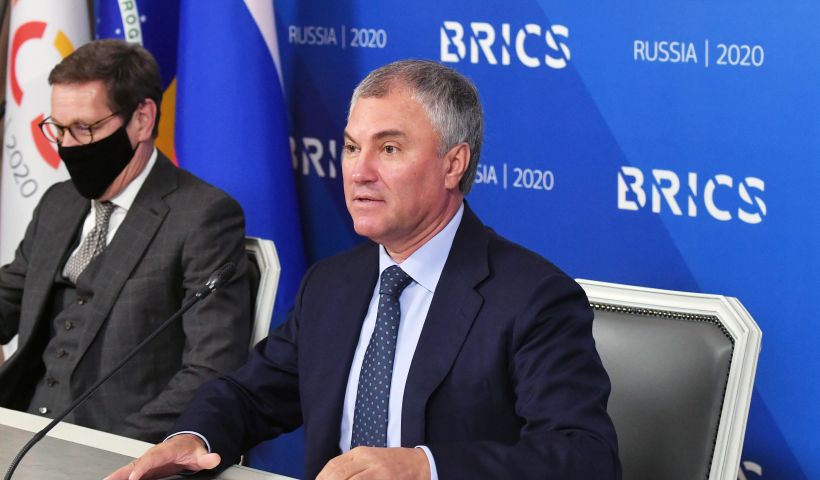On 27 October 2020, the Sixth BRICS Parliamentary Forum was held via videoconference.
The Forum participants, while noting the special role of legislative bodies in establishing BRICS as the influential factor in the international politics and economy, exchanged views on the development of BRICS inter-parliamentary cooperation in the interest of strengthening many faceted strategic partnership, global stability, common security and innovative growth.
They reaffirmed the focus of the parliaments of BRICS countries on cooperation in the formation of a multipolar international system based on the sovereign equality of states, non-interference in their internal affairs, the right of all peoples to determine their own destiny, renunciation of the threat or use of force, mutual respect for the interests of all participants, protection of human rights and fundamental freedoms. In the year of the 75th anniversary of the establishment of the United Nations, they reaffirmed support for strengthening the central coordinating role of the UN in international affairs on the basis of the generally recognized norms and principles of international law enshrined in the Charter of this universal Organization, and also emphasized the inadmissibility of attempts to undermine and revise the existing international legal framework and the introduction of any measures of a coercive nature that are contrary to international law and the UN Charter.
While celebrating the 75th anniversary of the end of World War II and the Victory over Nazism, they noted the need to intensify efforts, including at the legislative level, in the fight against justifying Nazi ideology, racism and xenophobia, distortion of history, including the causes, course and results of World War II;
They have expressed deep concern about the international challenges posed by the COVID-19 pandemic, its drastic impact on human health, social and economic spheres on a global scale, as well as such problems as imposing unilateral actions and protectionism.
They have agreed to pay special attention to strengthening the capacity of the World Health Organization, further building up the positive contribution of the BRICS countries to international health security, as well as legislative initiatives undertaken within the framework of the BRICS group in this area, including all possible assistance in the implementation of the provisions of the Ufa (2015) and Xiamen (2017) Declarations of the BRICS Summits on intensifying efforts to combat the risks of infectious diseases, as well as an early and effective commissioning of the BRICS Center for Vaccine Research and Development;
They have confirmed the interest in exchanging experience and cooperation in the area of public health care, in matters of "post-COVID" economic recovery, including support for small and medium-sized enterprises, improving labor legislation, social protection of citizens, development of remote areas;
They have noted the relevance of legislative support for the achievement of the UN Sustainable Development Goals 2030 and the provision of parliamentary support for cooperation between the BRICS countries in the field of economy and trade, climate change, poverty eradication, women and children rights, the fight against corruption, culture, science, education, civil society, youth contacts, sports, as well as solutions to other most pressing social issues in the regional and global dimensions;
They have expressed the intention to strengthen and to develop the inter-parliamentary cooperation in fighting against terrorism and the financing of terrorist activities; They have emphasized the importance of developing a regulatory framework for cooperation among the BRICS countries in the field of new technologies and the digital economy, ensuring the digital sovereignty of states, protecting the rights of citizens in the digital space;
In order to expand the legal framework of the BRICS multifaceted cooperation in line with the current realities and to facilitate the search for best collective responses to modern global challenges, they spoke in favor of developing a regular communication mechanism for legislators of the BRICS States to exchange views on topical issues on the international agenda.
The Forum participants called for the further development of the BRICS parliamentary dimension.
